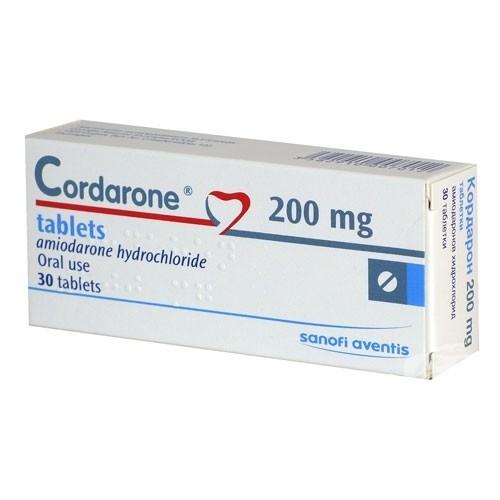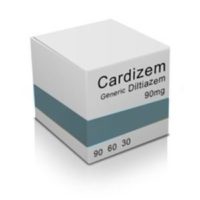Description
Drug Uses
Cardarone is used for treatment of irregular heartbeat and to maintain a normal heart rate. It may also be used for other conditions as determined by your doctor.
How Taken
Use Cardarone as directed by your doctor. It is recommended to take Cardarone with a meal. However, it is more important to take it consistently with regard to meals. If you take it with food, try to always take it with food to improve absorption of this medicine. If you prefer to take it on an empty stomach, then always try to take it on an empty stomach. Avoid eating grapefruit or drinking grapefruit juice while taking Cardarone. Take Cardarone at the same time each day.
Warnings/Precautions
Before taking Cardarone, tell your doctor or pharmacist if you have any medical conditions, especially if you have allergies to medicines, foods, or other substances, if you are allergic to any ingredient in Cardarone, if you have a history of liver problems, lung disease, heart problems, low blood pressure, thyroid problems, electrolyte problems (eg, low blood potassium or magnesium), eye problems, or sinoatrial heart block, you will be having surgery, or if you take medicine for diabetes, if you are pregnant, planning to become pregnant or are breast–feeding. Cardarone has been shown to cause harm to the fetus. If you think you may be pregnant, discuss with your doctor the benefits and risks of using Cardarone during pregnancy. Cardarone is excreted in breast milk. Do not breast–feed while taking Cardarone. Some medicines may interact with Cardarone. Therefore tell your doctor of all prescription or nonprescription medicine, herbal preparation, or dietary supplement that you are taking. Do not take Cardarone if you have you have complete, second degree, third degree, or severe sinoatrial heart block, an abnormally slow heartbeat, or shock due to serious heart problems, or if you have had fainting due to slow heartbeat (except if you have a pacemaker), if you are taking cisapride, dofetilide, an H1 antagonist (eg, astemizole, loratadine, terfenadine), an HIV protease inhibitor, a phosphodiesterase type 5 inhibitors (eg, vardenafil), or a streptogramin (eg, dalfopristin). Long–term exposure to Cardarone may cause blue–gray discoloration of the skin, particularly of the face and hands. This effect is not harmful and usually reverses, sometimes incompletely, after the medicine is stopped. Avoiding prolonged exposure to the sun may help to prevent this effect. Limit alcoholic beverages while taking Cardarone. It may take several days to weeks for Cardarone to work. A response may not be seen for up to 3 weeks after the medicine is started. Cardarone stays in your body for weeks or months, even after you are no longer taking it. Therefore, caution is advised not only during treatment, but for several months after treatment with Cardarone has stopped if you are taking any interacting medicines. Cardarone may cause skin reactions similar to serious sunburn or sensitivity to sunlight. Avoid exposure to the sun, sunlamps, or tanning booths. Use a sunscreen or wear protective clothing if you must be outside for a prolonged period. Before you have any medical or dental treatments, emergency care, or surgery, tell the doctor or dentist that you are using Cardarone. Carry an identification card at all times that says you are taking Cardarone. Use Cardarone with extreme caution in children. Safety and effectiveness have not been confirmed.
Missed Dose
If you miss a dose take it as soon as you remember. However if it is almost time for the next dose, skip the Missed Dose and continue your regular dosing schedule. Do not take a double dose to make up for a missed one.
Possible Side Effects
Some of the Possible Side Effects are– Abnormal skin sensations, bitter taste in mouth, blue–green discolouring of skin (especially hands or feet), constipation, decreased sexual interest, dizziness, dry eyes, flushing of the face, headache involuntary muscle movements, nausea, poor coordination, tiredness, trouble sleeping, vomiting. Contact your doctor if any of these or other side effects occur. If you experience any of the following serious side effects, you should seek medical attention immediately– allergic reactions, chest pain, chills, coldness, cough, coughing up blood, dark urine, decreased urination, easy bruising or bleeding, enlarged thyroid gland, fatigue, fever, irregular pulse, menstrual changes, muscle pain, tenderness, or weakness, nervousness, persistent sore throat, severe dizziness, severe stomach pain, shortness of breath, skin reaction similar to serious sunburn, slow heartbeat, sluggishness, sweating, uncontrolled shaking or tremor, unexplained weight change, vision changes, wheezing, worsening of irregular heartbeat, yellowing of the skin or eyes.
Storage
Store Cardarone at 59 – 77 °F (15 – 25 °C). Store away from heat, moisture, and light. Do not store in the bathroom. Keep Cardarone out of the reach of children.
Overdose
If overdose is suspected seek medical attention immediately. Some of the symptoms of Cardarone overdose are– fainting, severe dizziness, unusually slow pulse, weakness.
More Information
Cardarone may cause dizziness, lightheadedness, or blurred vision. These effects may worsen if Cardarone is taken with alcohol or certain other medications. Use Cardarone with caution. Do not drive or perform other possibly unsafe tasks until you know how you react to this drug. If your symptoms do not improve or if they worsen, contact your doctor. Cardarone should be used only by the patient for whom it has been prescribed. Do not take less or more or take it more often than prescribed by your doctor.
Disclaimer
This is only general information, it does not cover all directions, drug integrations or precautions. You should not rely on it for any purpose, it does not contain any specific instructions for a particular patient. We disclaim all responsibility for the accuracy and reliability of this information. We`re not responsible for any damage.




Reviews
There are no reviews yet.